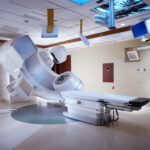One in four children born with congenital heart disease requires a life-saving procedure, either emergency surgery or heart catheterization.
Critical congenital heart disease can be picked up by a simple, painless, non-invasive test involving a sticker on the newborn’s hand and foot that is hooked up to a machine that can evaluate oxygen levels in the blood (a pulse oximetry machine). This test is commonly known as the critical congenital heart disease screen, (or CCHD screen).
The American Academy of Pediatrics recommends universal newborn screening to identify newborn heart disease. Based on these recommendations, in 2014, Pennsylvania enacted the “Newborn Child Pulse Oximetry Act” with the goal of screening all newborns in our state for critical congenital heart disease. While this legislative change has been instrumental in identifying critical heart conditions in infants, there is still work to do to reach the goal for 100% of newborn babies being screened.
Here at UPMC Children’s Hospital of Pittsburgh, children receive life-saving heart surgery before they have a chance to get critically ill.
One such story is of Gia, who resides in Ridgway, PA. Gia was born in July 2013 at Dubois Medical Center…she received a pulse-ox screen, and as they were ready to leave the hospital, they learned that she failed and had to immediately be transferred to UPMC Children’s Hospital of Pittsburgh for care.
She was admitted to the cardiac intensive care unit and was diagnosed with hypoplastic left heart syndrome, a severe congenital heart defect in which the left side of the heart is underdeveloped. Gia has gone on to have 3 stages of single ventricle surgery (Norwood, Glenn and Fontan surgeries).
Gia, now 6 years old, is doing great. She is going to school and loves to dance!
To learn more, please visit http://www.chp.edu/our-services/heart.









